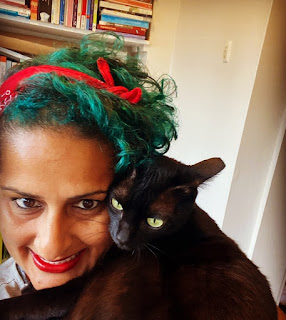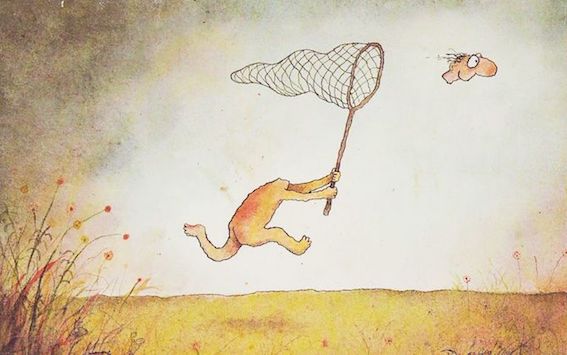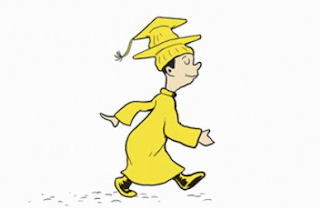Thesis interrupted: Anisha's story
This year has been full of change, uncertainty and instability. For many research students, the COVID pandemic has significantly disrupted their professional and personal lives, as projects have to be reimagined, working habits are forced to evolve, and people are separated from their peers and families. While the current circumstances are quite unusual, they seem to reinforce that there is no typical or normal experience of the PhD. Research takes place in the context of a human life and its unique vicissitudes. Yet it's amazing how readily we assume things should go a particular way and that something is wrong when life happens.
The piece below is written by a dear friend of mine, Anisha Gautam. Anisha and I met and became friends in a PhD lab many years ago - she started her thesis around the time I was finishing. We spent countless lunch hours together as part of a community of PhD students, sharing our woes and making each other laugh. Anisha recently returned to her thesis after a five year break, during which she thought she'd left it behind. I asked her to share her story because it highlights how unpredictable the course of a doctorate can be, how interwoven this work is with the rest of our lives, and the critical role that our felt experience plays in the process.
***
I started my PhD a decade ago, in 2010. There were many reasons for me not to have enrolled. I have ADD and studying had long been a struggle for me, even with medication. I have clinical depression, which had already led to a disruption in my studies as an undergraduate. Perhaps most importantly, I had never really had any desire to do a PhD. But when I did well in Honours, and my supervisor encouraged me to apply for the program, I decided I would. Because, I thought, why not?
I did well enough for the first four years of my candidature. I had a good relationship with an albeit absent supervisor. I had a desk in a communal PhD lab, where I worked alongside and was supported by friends and fellow scholars. I had a scholarship that allowed me a degree of financial freedom. And I was able to balance the isolation of research with intermittent teaching, which I absolutely loved. During these years, I produced three quarters of a full draft of my dissertation.
Then, I hit the wall. It’s a wall I know many PhD students are familiar with. It’s the wall you hit when the project has been going on for too long; it’s the wall you hit when you are no longer as excited by your project; it’s the wall you hit when you are overworked and under slept and you want it all to go away. For me, just how high and wide this wall would turn out to be, would depend on whether my mental health became a factor.
Unfortunately, it did become a factor. Although I had been well for the first four years of my PhD, I now started to feel unwell. Either the slump triggered my depression, or my depression led to the slump. Whatever the chain of cause and effect, the result was that I started to bottom out. My body slowed down, then my mind, and I lost the ability to concentrate. As I failed to produce work, I lost self-esteem and self-regard which, in turn, decimated any motivation I might have had left to even read through literature, let alone write. From there, it was a short step to losing the motivation to even get out of bed.
In the years since I started, the university had been working towards significantly tightening the length of the PhD candidature. Where once candidatures over four years had been tolerated, albeit grudgingly, it was now unofficial policy to pressure students into finishing within three and a half to four years. My enrolment was changed from annually to biannually, which meant I had to face a panel every semester to justify my place in the program. So, on top of the pressures created by my personal circumstances, were the added pressures I faced from my Faculty and from the Graduate Research School to finish my PhD.
In the end, it all became too much and too hard, and four years after I had started and, arguably, within sight of the finish line, I lost my motivation and momentum.
So, when in 2015, my then husband was offered a job in Singapore, I found myself facing two very different choices: stay and finish my PhD or leave it behind, move to Singapore and get on with my life. I decided to move to Singapore.
Of course, hindsight is, as they say, 20/20 but I don’t think I would have made this decision had I been well. Unfortunately, by this point in time, I had only one desire and that was to get rid of this thing that was increasingly nothing but a burden.
***
When I applied to officially withdraw from my PhD candidature, I did so with an intention of finality. As far as I was concerned, that part of my life was over, and I was never going to return to it. Submitting that form, and initiating that administrative withdrawal, was the easy part. What I didn’t foresee was just how difficult it would be for me withdraw emotionally from my thesis, and from my candidature; how existentially excruciating it would be to disengage myself from it and to let it go.
Like many other institutions, academia is built on ego. Being a scholar or an academic requires you to embrace an identity built on a hard, unbending “I.” It is an unconscious, unexamined part of the job to identify with your work as you acquire knowledge; to identify with yourself as an ‘expert’, a scholar, an academic; to identify with your institution. It is part of the job to insist on your own importance and your own rightness so that you can declare: “I argue, I assert, I insist.”
As a PhD candidate I had, without realizing it, come to identify with institutional ideas of what it means to do a doctorate, and what it means to become a scholar and an academic. At some point, my PhD had stopped being a project, something I was working on, and had instead become a part of me, something intimately tied to my sense of self. I had begun to define myself through it, and it had started to define me.
Because of this identification, as I began the emotional labour of disengaging myself from my PhD, I was pulled into an acute crisis of self. It was a slow, often-painful process of, letting go and moving beyond an identity I was deeply invested in. I can recall trying to say the words “I am more than my PhD” and failing, out of sheer terror, at what lay on the other side of that declaration. I felt that in setting the project aside, I was setting myself aside; that I was somehow negating myself, participating in my own eventual non-existence.
The act of disidentifying with the project and the ego to which it was bound, took years. It was a long process of coming to terms with the guilt and shame of not being able to finish it, self-loathing at my perceived emotional weaknesses, regret for having started at all, and anger about the grand unfairness of it all.
Neither my husband nor my family could understand why I had made the decision to walk away from my PhD. They felt it was about a lack of will, that I was “giving up”. But it was much simpler than that: it was a matter of survival.
***
When my marriage ended a year ago, I came back home to so many wonderful things: a loving and supportive family and friends, minimum wage, great coffee, and the unique greens, browns and greys of this beautiful land. But I also came back to a still unfinished thesis.
I was deeply ambivalent about whether I should resume my candidature. It had been five years since I had engaged with my thesis in any meaningful way. Academic discourse evolves quickly, and I had no idea whether my work still held any relevance.
On the other hand, I had already spent five years on the thesis and I knew that being able to see it through to the end, despite the hurdles, would go a long way towards healing some of those emotional wounds created by what I still perceived to be my initial ‘failure.’ In the end, I decided to give it one more chance.
***
It has now been six months since I resumed my candidature. I am enrolled at a different university with a different supervisor, one who is proactive and supportive, who believes I have something important to contribute to the world of ideas. I have also changed my candidature from a PhD via thesis to a PhD via publication. This has been an important change in the right direction because the work I have already produced is structurally better suited to a PhD via publication.
I have spent much of that time learning how to inhabit once again that complex, very much embodied, intellectual and emotional space called ‘PhD student.’ I have also, at the same time, begun to re-engage with my work.
For the reasons I have already talked about, these steps have not been easy to take. They have been very small steps, often followed by many big pauses, as I sit and process the emotions that I have now spent years working through - fear, anxiety, disappointment and, most difficult of all, shame.
For example, the first thing I did after re-enrolling was to print out a hard copy of my draft. This was not only because I read and edit better on paper, but also because I wanted to get a physical sense of the work I had already done. I wanted to hold it and feel it.
Once I had printed it out, though, I suddenly didn’t want anything to do with it. It was at least a week before I could bring myself to open it. Another fortnight before I could bring myself to read it. And yet another couple of months before I could pick up where I had left off and begin to work on it. Six months later, there are still mornings when I am overcome with fear when I see it sitting quiescent on the desk in my study.
It is at such moments that the commitment I have made to approach my PhD with consideration becomes important. Practically, this has involved learning the very difficult skill of mindfully watching those complex emotions arise over again, and allowing them to move through me, while still holding my centre. Or, as my psychologist suggests, taking a step back and saying: “I see you there, I acknowledge your presence, but you are not me and I am not you.”
It is an incredibly difficult thing to do. Half the time, because I have big emotions, I am overwhelmed before I can even remember to be mindful. And the rest of the time, even when I do remember, I am swept away regardless. I persist, though, because I have a goal and I know that learning these skills is going to play an important part in my ability to reach that goal.
And mindfully engaging with my thesis, and with myself as PhD student, has brought about many unexpected joys. Holding a physical copy of my thesis in my in hands was a difficult experience but, as I learned to sit with it, it also revealed itself to be a joyful experience. A thesis can feel like an abstraction when it exists only as a digital artefact. I had never seen it in its entirety or felt the heft of this thing that had so influenced the past 10 years of my life. My 60,000 words printed on paper, though, was an artefact I could see and touch and hold; it existed, and its physical reality brushed up against my physical reality. It was genuinely moved by this experience - I was amazed, and I was proud. Re-engaging with the ideas that had once so fascinated and absorbed me has also reawakened some of the joy that I once felt at this type of intellectual exercise. There are moments when I immerse and lose myself in the ideas and the language only to emerge hours later and find that I have managed to write one paragraph, a couple of paragraphs, or an entire page.
Sometimes the writing is glorious, needing little revision, and sometimes ungainly and indelicate, inevitably bound for erasure. But I am writing again and for now, that is the most important thing.
***
Anisha Gautam is a writer of terrible fiction and better non-fiction. She currently works at The University of New South Wales, Sydney, and is completing her PhD in the area of Gender and Critical Race Theory at the University of New England, Armidale. She lives with her beloved and incessantly needy cat Soot.



Comments
Post a Comment